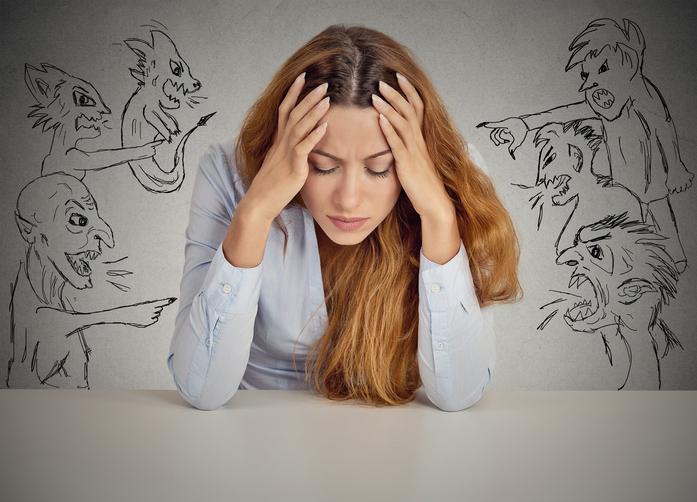The more something is imposed on us, the more we react strongly to this assault on our freedom. We react not only by denying it, but by adopting an opposite position. For example, if we try to get our child to stop hanging out with a friend we disapprove of, in all likelihood that particular friend will become even more likable and interesting.
Likewise, if we try to get him to eat healthy foods, he may react by deliberately seeking out the less healthy options. This emotional reaction is known as psychological reactance and is not simple rebellion in and of itself. In this PsychologyFor article, we will talk about Psychological reactance: what it is, effects, consequences and examples< Discover the consequences of someone imposing their ideas on you and that leads you to adopt or reinforce contrary ideas.
What is reactance in psychology
The initial reaction when faced with uncontrollable outcomes is not typically the sense of acquired helplessness, but rather a heightened motivation to regain our loss of control and freedom. Brehm coined the term psychological reactance to describe the motivational condition that is activated when we feel that our freedom of action is threatened somehow.
If you want to know more about this concept, in this article we explain what freedom is and how to put it into practice.
Brehm’s theory of psychological reactance
The theory of reactance is part of the field of social psychology and was developed by Jack Brehm in 1966 and extended to clinical psychology by Sharon Brehm in 1976. The concept of psychological reactance describes the motivational force that pushes to restore lost freedom or threatened with not being able to adopt freely desired behavior.
Mainly, psychological reactance is manifested by not wanting to adhere to a mandate and adopting behavior opposite to what is ordered. In these situations it is important to learn to make good use of freedom.
Effects of psychological reactance
What are the most common psychological reactions of reactance? Prohibition makes us feel threatened in what we consider our right to choose and automatically activates rebellion. Therefore, when faced with a threatening situation we do not respect it, or we even do the opposite of what is asked of us. This further intensifies the prohibited behavior.
What is forbidden becomes even more tempting< If before it was desirable but on par with other options, now the fact of being prohibited suddenly makes it a priority and inalienable. We all know that we suddenly feel all the importance of something or someone the moment we run the risk of losing it or having it taken away from us.
Consequences of psychological reactance
According to this theory of psychological reactance, humans are deeply motivated by the desire to feel responsible for ourselves and to be free from the rules and suggestions of others. Thus, the psychological reaction caused by reactance predicts that if people believe that their freedom to choose how to live is being attacked or manipulated, they will feel a strong desire to react until the pressure is removed.
Psychological reactance can take many forms depending on the circumstances. Actions or items that are restricted appear more valuable and interesting at the moment when our access to them is threatened. For example, this type of emotional reaction can occur when we are overly induced to accept an attitude or opinion. In such situations, we reaffirm our freedom by adopting the opposite point of view of the one they want to impose on us.
In particular, this type of reaction can be easily observed in children, who are especially fascinated by toys or activities that are prohibited to them. Another example of psychological reactance can be found in adolescents, who often break parental rules precisely to symbolically reaffirm their freedom. If you want to know how to act in these cases, in this article you will see how to use reverse psychology on a child.
Examples of psychological reactance
Reverse psychology applied in the theory of psychological reactance is very common and is used in many everyday situations. People tend to rebel when something is forbidden, a freedom is taken away, or they are told they are wrong.
Below, we present some of the examples of psychological reactance:
- Confinement of the population in their homes due to Covid-19: faced with the perceived threat of restriction of freedom from the pandemic, individuals adopt behavior whose effects depend on the proportionality of the threat, the source of the threat, the duration of the deprivation and the coercive aspect of the request.
- boomerang effect: refers to the rejection of the other’s position by the person being persuaded. This means that this pressured person adopts different behavior, but not necessarily contrary to what was originally intended.
- Censorship effect: It is a type of psychological reactance in which the censored object or behavior becomes much more attractive to the target than before its censorship. For example, in the story of Romeo and Juliet they are prohibited from going out and being together and this prohibition becomes the main reason that pushes them to be together.

This article is merely informative, at PsychologyFor we do not have the power to make a diagnosis or recommend a treatment. We invite you to go to a psychologist to treat your particular case.
If you want to read more articles similar to Psychological reactance: what it is, effects, consequences and examples we recommend that you enter our Cognitive Psychology category.
Bibliography
- Forgas, J.P. (2002). Interpersonal behavior. La psychology dell’interazione sociale. Rome: Armando Editore.
- Locci, G., Occhini, L. (2005). Atteggiamenti and communication. Aras Edizioni.
- Montesi, L. (2017). Più me lo proibisci, più lo faccio: psychological response. Retrieved from: https://www.centropagina.it/benessere/piu-me-lo-proibisci-piu-lo-faccio-la-reattanza-psicologica/








